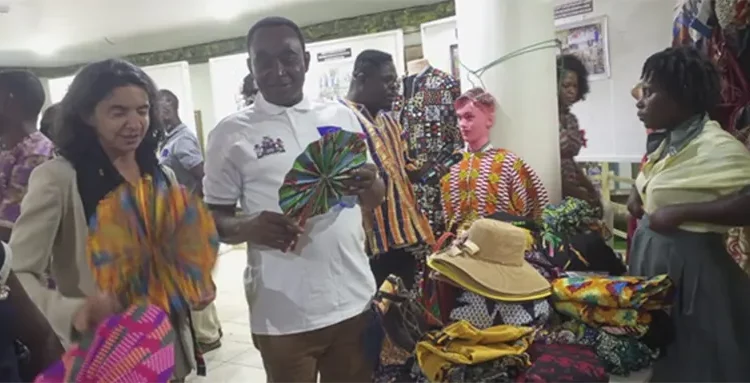Some officials at the event at the exhibition stands
The Twin-Cities in Sustainable Partnership Project (TCSPP), a three-year European Union (EU)-funded initiative, has provided numerous livelihood opportunities for residents in the Sekondi-Takoradi Metropolis.
The €3 million project, co-funded by the EU and the Sekondi-Takoradi Metropolitan Assembly (STMA), and implemented in collaboration with the Municipality of Palermo in Italy, also aimed to enhance urban management and strengthen climate resilience.
The TCSPP has officially concluded after delivering significant benefits to about 13,304 people within the STMA.
The project achieved a remarkable array of outcomes designed to improve lives while protecting the environment.
Under the initiative, three new health centres dedicated to youth reproductive health and counselling services were constructed.
In addition, 14 social enterprises were established to drive the growth of the country’s circular economy, with a focus on supporting agribusiness and green technologies.
A dedicated skills training hub was also built to nurture the next generation of green entrepreneurs.
As part of its environmental interventions, over 10,800 fruit trees were planted to boost food security and help mitigate the effects of climate change.
About 120 eco-friendly ovens were distributed to local fishmongers to reduce emissions and promote sustainable livelihoods.
The project also delivered 500 household toilets for people living with disabilities (PLWDs), the elderly, and other vulnerable groups.
At a ceremony to officially conclude the project, the EU and its partners applauded the impact of the initiative and reiterated their commitment to sustaining its gains.
The Head of Cooperation at the EU in Ghana, Silvia Severi stated, “This project has not only transformed lives but also built a bridge of solidarity between Europe and Ghana.”
Sekondi-Takoradi Metropolitan Chief Executive, Fredrick Faidoo, tasked the Assembly’s Development Planning Office to develop a comprehensive sustainability plan for all project deliverables, ensuring adequate budget allocations in 2026 and beyond.
From Emmanuel Opoku, Sekondi


